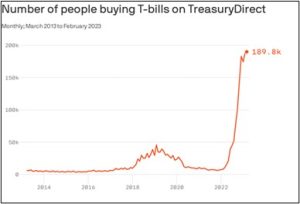Letter to Investors | PDF
Here we are, three and a half months into 2023: the Fed is still raising interest rates; a recession is widely expected to take hold this year; we have a banking crisis; the war between Russia and Ukraine continues to rage after more than a year; and the U.S. and China are at loggerheads on a host of issues. Yet, the stock market is up year-to-date? What in the world is going on here?
As we have pointed out in previous letters, bad things don’t typically hurt the market if they’re already anticipated. The same goes for positive news; if it’s widely anticipated, don’t expect it to move the market. The war in Ukraine has been going on for over a year. The 2023 recession (if it occurs) will be the most broadly expected recession in history. China and the U.S. have been bad-mouthing and threatening each other for at least six years. A material and unexpected change in these widely watched situations would move the markets, but the status quo would not.
On the other hand, the banking crisis and Fed behavior are another matter. It was our opinion, and the opinion of many others, that the Federal Reserve Bank would continue tightening (i.e., raising short-term interest rates) until it either brought down inflation or “something broke” in the financial system. That “something” turned out to be certain mid-size banks in the U.S. The failure of a couple of regional banks, plus the near collapse of a few others, was new news, completely unexpected by most of the market.
If you have been reading my letters, you know that I did not expect this either. Just this past January I wrote that “the banking system appears to be in very good shape relative to past cycles.” I’ve often said that we are not clairvoyant, and I suppose it’s important to prove that occasionally (I certainly did this time). My lack of fear for the U.S. banking system was based on my experience that most banking crises arise from credit problems in their lending activity, which overwhelms the reserves they set up for loan losses. Following the Great Financial Crisis of 2008, banks have built up their capital bases and tightened their lending standards, with a lot of encouragement by regulators.
The problem this time was one I frankly didn’t think I’d soon see again: borrowing short and lending long, that is, using short-term deposits to fund very long-term securities. This is the practice of chasing yield by buying long-term debt, in this case U.S. Treasuries and mortgage-backed securities. These are very safe assets from the perspective of credit risk, but any long-term loan (i.e., more than 10 years to maturity) will drop sharply in market value if interest rates rise. Finance people call this a duration mismatch, and it can be deadly to a financial institution, especially if depositors want their money back now. This is what led to the savings and loan failures of the early 1990s, a crisis recent enough that bank executives should have known better. It’s obvious now that some didn’t know better and made large bets that ruined their banks. However, most did not do that, so we do not expect a systemic banking crisis to develop.
But we have a banking problem nonetheless, one that the Fed and the FDIC have had to clean up. While fighting inflation and keeping employment strong are Fed legislative mandates, they are subservient to the primary mandate to maintain a safe and sound banking system. Since the troubles of these problem banks were directly related to rising rates, investors have judged that the current Fed tightening cycle will soon come to an end. This judgment is correct, in my opinion, and is the reason that the market has not fallen in response to the banking crisis. In fact, it’s gone up, even while most bank stocks have retreated. (The S&P 500 is up 7.8% year-to-date, as of this writing.)
The lesson to be drawn from these events is that it is nigh impossible to time investments relative to the news of the day, whether you correctly anticipate that news or not. Since we have proven we are not clairvoyant many times, we seek instead to invest in such a way as to increase the probability of good results. We have found that the quality of an investment and its valuation are the best determinants of positive long-term results. We have specific definitions of quality and of valuation that drive our decision-making across all our strategies. While these methods do not guarantee optimal performance every quarter, we believe they increase the odds of good performance over longer periods of time.
Benjamin Graham, the father of investment analysis, is quoted by his most famous disciple, Warren Buffet, as follows: “In the short run, the market is a voting machine, but in the long run, it is a weighing machine.” Both expected and unexpected events turn short-term investing into a volatile popularity contest. We’d rather spend our efforts identifying good investment assets that may be properly “weighed” over time to our advantage.
We appreciate your confidence in us.
Gratefully,
Mark A. Keller, CFA
CEO and Chief Investment Officer



